|
|
|
Sort Order |
|
|
|
Items / Page
|
|
|
|
|
|
|
| Srl | Item |
| 1 |
ID:
150988
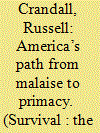

|
|
|
|
|
| Summary/Abstract |
Hal Brands’s Making the Unipolar Moment is a breath of fresh air on a topic politicised, or as often romanticised, for far too long.
|
|
|
|
|
|
|
|
|
|
|
|
|
|
|
|
| 2 |
ID:
153377
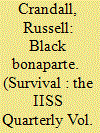

|
|
|
|
|
| Summary/Abstract |
The revolt of African slaves that erupted in Saint-Domingue in late August 1791 occurred in France’s most lucrative New World colony. Encompassing the western third of Hispaniola Island since 1659 and representing the most ‘profitable stretch of real estate on the planet’ according to historian Edward Baptist, the colony’s sugar, coffee, indigo and cotton served as the fuel for France’s ‘imperial engine’.1 Now, its sugar plantations were ablaze as slaves torched cane fields and killed their masters. With France’s own revolution having begun in 1789, free people of colour in Saint-Domingue also took up arms after French landowners refused to extend citizenship to them as laid out in the Declaration of the Rights of Man and of the Citizen. An independent Republic of Haiti was eventually established on 1 January 1804; by then, upwards of 350,000 Haitians and 50,000 French troops had been killed (the troops mostly from yellow fever), and the island nation’s economy lay in tatters.2
|
|
|
|
|
|
|
|
|
|
|
|
|
|
|
|
| 3 |
ID:
172490
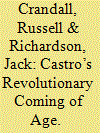

|
|
|
|
|
| Summary/Abstract |
Jonathan M. Hansen’s admirably analytical and detailed Young Castro shows how the revolutionary figure compellingly portrayed in Tony Perrottet’s Cuba Libre! emerged.
|
|
|
|
|
|
|
|
|
|
|
|
|
|
|
|
| 4 |
ID:
188459
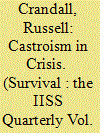

|
|
|
|
|
| Summary/Abstract |
Since the middle of the twentieth century, Fidel Castro has cast an outsized shadow over all things Cuba, as if the Cuban leader and the communist Caribbean nation were one and the same. Yet, as veteran New York Times correspondent Anthony DePalma contends in his book The Cubans: Ordinary Lives in Extraordinary Times, this reflex obfuscates the complex society that is increasingly at cross purposes with all things Fidel. The author’s keen profiles of ‘ordinary’ citizens give readers an unvarnished entry into the so often unimaginable, surreal or heart-breaking realities at the core of contemporary Cuban life.
|
|
|
|
|
|
|
|
|
|
|
|
|
|
|
|
| 5 |
ID:
021037
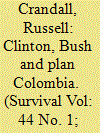

|
|
|
|
|
| Publication |
2002.
|
| Description |
159-172
|
|
|
|
|
|
|
|
|
|
|
|
|
|
|
|
| 6 |
ID:
177920
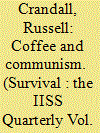

|
|
|
|
|
| Summary/Abstract |
Augustine Sedgewick’s Coffeeland: One Man’s Dark Empire and the Making of Our Favorite Drug is exquisitely written, if somewhat skewed politically.
|
|
|
|
|
|
|
|
|
|
|
|
|
|
|
|
| 7 |
ID:
122015
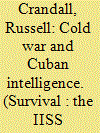

|
|
|
|
|
| Publication |
2013.
|
| Summary/Abstract |
On 25 April 2013, US government judicial officials unsealed an indictment from 2004, charging Marta Rita Velazquez, a former legal officer at the US Agency for International Development (USAID) of spying for the Cuban government. In 2002 Velazquez had prudently fled to Sweden, which does not extradite individuals accused of espionage to the United States because it is considered a political crime.
|
|
|
|
|
|
|
|
|
|
|
|
|
|
|
|
| 8 |
ID:
186372
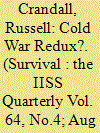

|
|
|
|
|
| Summary/Abstract |
In The Twilight Struggle, diplomatic historian Hal Brands urges readers to revisit Cold War history to gain vital insights and lessons regarding the United States’ unfolding geopolitical and ideological competition with Russia and China, which he sees as unfolding in the ‘no-man’s land between peace and war’. The author does not believe that the Cold War is a perfect facsimile of today’s fraught global environment, but the struggles of the twentieth century are nonetheless startlingly similar, not least because the threats of failure, decline and even annihilation are as acute today as they were then. Brands’s timely book details the strategies employed by America’s Cold Warriors in their contest with the Soviet Union, suggesting that they remain relevant today. The question is whether the United States and the West are willing and able to heed the author’s warning and act accordingly.
|
|
|
|
|
|
|
|
|
|
|
|
|
|
|
|
| 9 |
ID:
130870
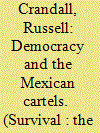

|
|
|
|
|
| Publication |
2014.
|
| Summary/Abstract |
In El Narco, journalist Ioan Grillo provides an overview of the history and dynamics of the Mexican drug war. For years, American and Mexican anti-drug authorities believed that the elusive capo of the Sinaloa Cartel, Joaquín Guzmán, known as 'El Chapo' or 'Shorty', was hiding out in the remote Sierra Madre. But fresh intelligence, apparently gleaned from Guzmán's captured bodyguards, indicated that he had been making clandestine trips to Culiacán, capital of Sinaloa State, and the Northern Pacific resort of Mazatlán. In the early hours of 22 February 2014, ten pickup trucks carrying Mexican marines pulled up at the Mazatlán condominium where Guzmán was believed to be staying. Breaking down its steel-reinforced door, the soldiers found him in bed with his ex-wife, a former beauty queen. Guzmán may have been visiting Mazatlán for only a day or two to see his twin baby daughters, who were also present, before returning to safer confines in the mountains. Although he did tussle with his captors, Guzmán did not attempt to use the machine gun that rested near his bed. No shots were fired in the raid, despite the fact that agents confiscated 97 rifles and machine guns, 36 handguns, two grenade launchers, a rocket launcher and 43 vehicles, many of which were armoured. Having beaten Guzmán and dragged him outside to confirm his identity, the marines transported their prisoner to Mexico City and, finally, a federal detention centre. Shorty had escaped from the high-security Puente Grande Prison in 2001, allegedly in a laundry van, and had been on the run for 13 years. Now that they had him in their hands once more, the Mexican authorities went out of their way to ensure that he would remain in custody.
|
|
|
|
|
|
|
|
|
|
|
|
|
|
|
|
| 10 |
ID:
122016
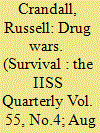

|
|
|
|
|
| Publication |
2013.
|
| Summary/Abstract |
In June 2012, an American drug enforcement agent shot and killed a suspected drug trafficker during a raid on a smuggling operation in Honduras, the impoverished Central American country with the world's highest murder rate. Just a few weeks earlier, Honduran security officials, shadowed by US agents as part of Operation Anvil, accidentally killed four civilians, including two pregnant women, in the country's remote and now drugs-and-thugs-infested Mosquito Coast. These are only some of the more recent murky moments in the decades-long, US-led drug war in Latin America: a conflict that is highly controversial, expensive and far from over. Yet since the 'war on drugs' was launched by US President Richard Nixon in 1971, there have been few episodes in which a US operative on the ground has killed someone as part of the conflict.
|
|
|
|
|
|
|
|
|
|
|
|
|
|
|
|
| 11 |
ID:
183793
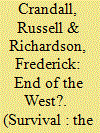

|
|
|
|
|
| Summary/Abstract |
In The Abandonment of the West, Michael Kimmage explores the relationship between American foreign policy and the ‘West’. The concept of the West, once a unifying idea in American culture, has undergone a sharp re-evaluation over the last century. Kimmage does not idealise the West or its history, giving a voice to the many critics of Western civilisation who have pointed out examples of US hypocrisy. At the same time, he notes that the West, especially in its heyday, accomplished great things, and he cautions against its wholesale abandonment – particularly at a time when the US and its allies are facing a host of domestic and international challenges.
|
|
|
|
|
|
|
|
|
|
|
|
|
|
|
|
| 12 |
ID:
163595
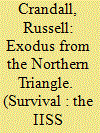

|
|
|
|
|
| Summary/Abstract |
The caravans of migrants that the White House rails against may become larger and more frequent the more it tries to implement its restrictive agenda.
|
|
|
|
|
|
|
|
|
|
|
|
|
|
|
|
| 13 |
ID:
188808
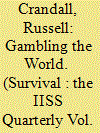

|
|
|
|
|
| Summary/Abstract |
From North Korea to Ukraine to Iran, the spectre of nuclear war continues to loom over global affairs. In his timely history Nuclear Folly, Harvard historian Serhii Plokhy takes a fresh and intentionally international look at one of the most fraught moments of the Cold War: the Cuban Missile Crisis. Contrary to the conventional view that US president John F. Kennedy brilliantly out-foxed his inept Soviet counterpart, Nikita Khrushchev, Plokhy posits that both sides repeatedly erred and misread each other – greatly increasing the likelihood of mutual annihilation. Plokhy draws lessons from the crisis for contemporary decision-makers, noting that the power to wield nuclear weapons still resides in a small number of hands.
|
|
|
|
|
|
|
|
|
|
|
|
|
|
|
|
| 14 |
ID:
160918
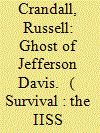

|
|
|
|
|
| Summary/Abstract |
In This Vast Southern Empire, Matthew Karp notes that the legacy of the vanquished Southern slaveholding class was quickly resurrected.
|
|
|
|
|
|
|
|
|
|
|
|
|
|
|
|
| 15 |
ID:
144112
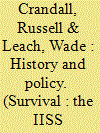

|
|
|
|
|
| Summary/Abstract |
Orange flames and smoke lit up Baghdad’s silhouetted skyline. It was 17 January 1991, and the Gulf War was finally under way. Five months earlier, in the early hours of 2 August 1990, Iraqi president Saddam Hussein’s forces had invaded Kuwait. After several days of deliberation and diplomacy, United States secretary of defense Dick Cheney and King Fahd of Saudi Arabia, meeting in the Kingdom, agreed that Washington would rush US forces to Saudi Arabia in order to prevent what appeared to be Saddam’s next conquest. For George H.W. Bush, this military response did not yet mean war. It was time, the US president and decorated Second World War veteran said on 5 August, to ‘push forward on diplomacy’. Yet, three days later, needing to convince a public and Congress fearful of any war’s protracted consequences, Bush’s tone had changed. For support, he turned to history: ‘Appeasement does not work … As was the case in the 1930s, we see in Saddam Hussein an aggressive dictator threatening his neighbors.’
|
|
|
|
|
|
|
|
|
|
|
|
|
|
|
|
| 16 |
ID:
157210
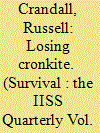

|
|
|
|
|
| Summary/Abstract |
Out of nearly 20 years of war in Vietnam, 1968, remembered for the Hanoi-led Tet Offensive, is understandably seen as America’s year of living dangerously. Less recalled by history, but perhaps equally fateful, was the year 1965. Until then, America’s stake in Vietnam had been portrayed as a secondary, even tertiary, strategic component of the global struggle against the spread of communism. Before 1965, president John F. Kennedy had insisted that Vietnam was to be their war, not ours, though he was willing to provide significant military and development assistance to president Ngo Dinh Diem’s regime, as well as military advisers. Even this limited involvement would require a swelling logistical military force as the Army of the Republic of Vietnam (ARVN) continued to struggle against a foe that proved to be more formidable than expected.
|
|
|
|
|
|
|
|
|
|
|
|
|
|
|
|
| 17 |
ID:
138606
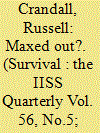

|
|
|
|
|
| Summary/Abstract |
Looking back on how decisively the Cold War ended in America’s favour, it is easy to forget how much doubt there was at the start, among Americans and Soviets alike, that the United States was up to the task of defending its vision of the post-war world order. George Kennan, the storied American diplomat responsible for the 1946 ‘Long Telegram’ from Moscow, recalled
in his memoirs that the Soviets ‘thought it probable that ... Americans, in particular, would not be able to muster, as a nation, the leadership, the imagination, the political skill, the material resources, and above all the national self-discipline necessary’ to prevail in the emerging global contest.
|
|
|
|
|
|
|
|
|
|
|
|
|
|
|
|
| 18 |
ID:
173665
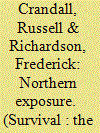

|
|
|
|
|
| Summary/Abstract |
Carrie Gibson’s El Norte vividly demonstrates that the United States would not be what it is today without strong, deep and underappreciated Hispanic influences.
|
|
|
|
|
|
|
|
|
|
|
|
|
|
|
|
| 19 |
ID:
103411
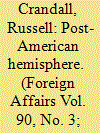

|
|
|
| 20 |
ID:
162731
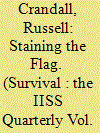

|
|
|
|
|
| Summary/Abstract |
In The True Flag, Stephen Kinzer approaches late-nineteenth-century US imperialism with commendable balance – until a condemnatory concluding chapter.
|
|
|
|
|
|
|
|
|
|
|
|
|
|
|
|
|
|
|
|
|